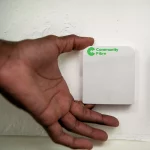Sponsored Links
Ofcom Shuns Public Sector Funding for Next Gen Broadband
Posted: 31st Jan, 2009 By: MarkJ
Ofcom's Partner Strategy and Market Development man, Peter Phillips, has followed up Thursdays publication of Lord Carters Digital Britain review by outlining the regulators own view in a new statement. Unsurprisingly Phillips toes the government line and shuns any notion of using public sector funds to aid in the rollout of future broadband services:
Phillips doesn't appear to recognise that a significant need for such next-gen services is to avoid that "market failure" from happening in the first place, as opposed to waiting until it bites before taking any action.
The latter mentality is risky, especially with certain types of online content (video) growing so fast that they could soon outstrip the ability of existing technologies to cope. Though he does make a fair point about the price of super-fast connections:
Indeed there's little point in having a 100Mbps connection if the pricing runs into business only territory. By modern standards an average 8Mbps link with 20 to 30GB of usage allowance might cost £20 per month, with unbundled (LLU) services often being even cheaper (e.g £15).
Unfortunately bandwidth still costs money and historically the adoption of faster services has caused people to do more online, raising usage; admittedly bandwidth costs can also reduce. Mind you, BT's preliminary Ebbsfleet fibre trials have already given us an idea of prices (news):
Typically such trials may have fewer restrictions, while any mainstream product would need to impose familiar usage allowances (FUP) to balance speed and flexibility with price. In Sweden they offer 100Mbps links with restrictions and mainstream pricing that are not unlike what we have for 8Mbps in the UK.
Sounds wonderful, 100Mbps for the equivalent of £15 to £20 per month - I'll take that! Unfortunately some of my Swedish friends also moan about how their actual performance is often far less, anything from 2Mbps to 6Mbps from what I hear. Such speeds are not dissimilar to those received via existing ADSL services.
We mustnt forget that future services are also about making sure that those who live further from their exchange can still get faster and more stable speeds, beyond even the 2Mbps minimum recommended under new Universal Service Obligation (USO) proposals. Ofcom also notes that next-gen isn't just about fixed-line services:
True, Mobile Broadband does have a part to play and its future services look extremely promising. However we worry that Phillips might be making the age old mistake of confusing theoretical maximums with real-world throughput.
Mobile Broadband connections already have future capacity problems to worry about and are even more aggressively impacted by reception quality and high contention than land-line services. It may help to plug the proposed 2Mbps USO but cannot be put up as a saving grace for super-fast solutions, maybe in another 10 to 15 years.
Still, BT will at least be pleased to hear Phillips say that Ofcom are about to finalise their regulatory position on next-generation broadband networks. This is expected to support a position where operators with market power can set their own wholesale prices. Rivals may not like it but it's not like the government are offering many alternatives.
"We continue to believe that for the time being investment in super-fast broadband should be primarily for the private sector at least until its clear how far that will go. Francesco Caios report for the government showed that large scale government intervention without a clear market failure could waste taxpayers money and chill private investment."
Phillips doesn't appear to recognise that a significant need for such next-gen services is to avoid that "market failure" from happening in the first place, as opposed to waiting until it bites before taking any action.
The latter mentality is risky, especially with certain types of online content (video) growing so fast that they could soon outstrip the ability of existing technologies to cope. Though he does make a fair point about the price of super-fast connections:
"Whats critical to companies investing in superfast broadband? Well the most important things are nothing to do with government or regulators. One is how much consumers want it and are willing to pay. Thats something no one really yet knows."
Indeed there's little point in having a 100Mbps connection if the pricing runs into business only territory. By modern standards an average 8Mbps link with 20 to 30GB of usage allowance might cost £20 per month, with unbundled (LLU) services often being even cheaper (e.g £15).
Unfortunately bandwidth still costs money and historically the adoption of faster services has caused people to do more online, raising usage; admittedly bandwidth costs can also reduce. Mind you, BT's preliminary Ebbsfleet fibre trials have already given us an idea of prices (news):
BT's Preliminary Ebbsfleet Fibre Options - JUNE 2008:
2.5Mbps down / 0.5Mbps up
Connection Fee: £80 (Monthly: £18.54)
10Mbps down / 2Mbps up
Connection Fee: £130 (Monthly: £21.45)
10Mbps down / 2Mbps up, burst to 30Mbps for downloads
Connection Fee: £130 (Monthly: £23.45)
10Mbps down / 2Mbps up, burst to 100Mbps for downloads
Connection Fee: £130 (Monthly: £28.45)
2.5Mbps down / 0.5Mbps up
Connection Fee: £80 (Monthly: £18.54)
10Mbps down / 2Mbps up
Connection Fee: £130 (Monthly: £21.45)
10Mbps down / 2Mbps up, burst to 30Mbps for downloads
Connection Fee: £130 (Monthly: £23.45)
10Mbps down / 2Mbps up, burst to 100Mbps for downloads
Connection Fee: £130 (Monthly: £28.45)
Typically such trials may have fewer restrictions, while any mainstream product would need to impose familiar usage allowances (FUP) to balance speed and flexibility with price. In Sweden they offer 100Mbps links with restrictions and mainstream pricing that are not unlike what we have for 8Mbps in the UK.
Sounds wonderful, 100Mbps for the equivalent of £15 to £20 per month - I'll take that! Unfortunately some of my Swedish friends also moan about how their actual performance is often far less, anything from 2Mbps to 6Mbps from what I hear. Such speeds are not dissimilar to those received via existing ADSL services.
We mustnt forget that future services are also about making sure that those who live further from their exchange can still get faster and more stable speeds, beyond even the 2Mbps minimum recommended under new Universal Service Obligation (USO) proposals. Ofcom also notes that next-gen isn't just about fixed-line services:
"Releasing spectrum can have a huge impact. Its wrong to think superfast broadband is just about fibre in the ground. Mobile broadband was rare only a year ago. Today, dongles and data cards probably account for 15% of broadband connections. And if you take into account all the 3G capable phones too, maybe as many as 25% of UK adults already have some form of mobile broadband.
In the next few months were planning to auction a huge chunk of spectrum suitable for high speed mobile broadband. And in 2012, once digital switchover is complete, further new high speed mobile networks could be switched on. Technologies keep moving forward. Just yesterday I read about some breakthrough European research to develop a technology - with a name I wont even try to pronounce - which could deliver wireless speeds of Gigabits per second."
In the next few months were planning to auction a huge chunk of spectrum suitable for high speed mobile broadband. And in 2012, once digital switchover is complete, further new high speed mobile networks could be switched on. Technologies keep moving forward. Just yesterday I read about some breakthrough European research to develop a technology - with a name I wont even try to pronounce - which could deliver wireless speeds of Gigabits per second."
True, Mobile Broadband does have a part to play and its future services look extremely promising. However we worry that Phillips might be making the age old mistake of confusing theoretical maximums with real-world throughput.
Mobile Broadband connections already have future capacity problems to worry about and are even more aggressively impacted by reception quality and high contention than land-line services. It may help to plug the proposed 2Mbps USO but cannot be put up as a saving grace for super-fast solutions, maybe in another 10 to 15 years.
Still, BT will at least be pleased to hear Phillips say that Ofcom are about to finalise their regulatory position on next-generation broadband networks. This is expected to support a position where operators with market power can set their own wholesale prices. Rivals may not like it but it's not like the government are offering many alternatives.
Search ISP News
Search ISP Listings
Search ISP Reviews
Latest UK ISP News








Cheap BIG ISPs for 100Mbps+
150,000+ Customers | View More ISPs
Cheapest ISPs for 100Mbps+
Modest Availability | View More ISPs
Latest UK ISP News
Helpful ISP Guides and Tips
Sponsored Links
The Top 15 Category Tags
- FTTP (6722)
- BT (3863)
- Politics (3036)
- Business (2736)
- Openreach (2629)
- Building Digital UK (2488)
- Mobile Broadband (2434)
- FTTC (2132)
- Statistics (2102)
- 4G (2062)
- Virgin Media (1997)
- Ofcom Regulation (1761)
- 5G (1692)
- Fibre Optic (1587)
- Wireless Internet (1581)
Sponsored
Copyright © 1999 to Present - ISPreview.co.uk - All Rights Reserved - Terms , Privacy and Cookie Policy , Links , Website Rules






























